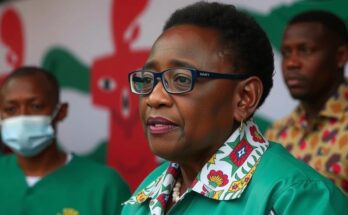In November 2023, significant challenges emerged in the Americas regarding freedom of expression and civic space, particularly in the wake of new U.S. legislation threatening nonprofits, rising violence against journalists in Bolivia, and ongoing repression in Nicaragua. Advocacy groups have called for urgent action to protect press freedom and combat gender-based violence across the region.
November 2023 proved to be pivotal in the Americas, showcasing challenges to freedom of expression and civic space. In the United States, newly passed legislation threatens the viability of nonprofit organizations, while Bolivia faces escalating violence against journalists. Concurrently, Nicaragua’s participation in the Universal Periodic Review at the UN Human Rights Council drew attention to ongoing human rights violations and the repression of independent media and civil society. The atmosphere of intimidation and violence against journalists exacerbates regional stability and threatens democratic processes across nations.
In the United States, November was marked by legislative actions such as H.R. 9495, empowering the Secretary of the Treasury to revoke tax-exempt status for nonprofits perceived as “terrorist supporting organizations.” This bill has drawn sharp criticism from advocacy groups, emphasizing concerns over its potential to instill fear among civil society actors. Commenting on this concern, Sarah Yager from Human Rights Watch stated, “This legislation threatens the ability of independent groups to engage with the U.S. government on human rights abuses around the world and creates a climate of fear and intimidation. The US Senate should reject this bill.”
Moreover, the U.S. elections raised fears regarding press freedom, particularly with the anticipated return of Donald Trump, who has consistently targeted media entities critical of him. This antagonism risks not only exacerbating domestic challenges but also undermining international commitments to support independent journalism. Countries across Latin America are likely to suffer further deterioration in press freedoms and greater repression as authoritarian practices take root amid economic hardships.
Bolivia’s climate has grown increasingly hostile towards the media, fueled by political unrest and anti-government sentiments. Reports indicate a surge in violent attacks against journalists covering protests, with numerous incidents involving harassment and physical violence. This trend can be attributed to a systematic effort to delegitimize independent journalism, a strategy employed by previous and current administrations to control the narrative and suppress dissent. The result of this contentious environment has seen Bolivia ranked 124th in the 2024 World Press Freedom Index.
In Nicaragua, the Universal Periodic Review by the UN Human Rights Council underscored urgent calls for action to address significant human rights abuses, including harassment of journalists and suppression of freedoms related to expression and assembly. Advocacy groups highlighted the necessity for international oversight and the dismantling of oppressive legal frameworks that sustain the current atmosphere of fear in the country. Recommendations from the Working Group reflect widespread concern regarding the government’s systematic targeting of dissenting voices and independent media.
Advancements were also made regarding gender-based violence with IFEX member organizations participating in initiatives related to the International Day for the Elimination of Violence Against Women. Groups throughout the Americas engaged in campaigns designed to raise awareness and challenge systemic violence against women, emphasizing the unique barriers women face in both the public and political spheres.
As November concluded, challenges to free expression and civic space in the Americas remained formidable. Advocacy for press freedom and human rights must continue vigorously to counteract emerging authoritarian trends during a period marked by increasing violence against dissidents and journalists. It is paramount that both regional and international communities acknowledge and act against these growing threats to civil liberties.
The report highlights the deteriorating state of civil rights and media freedoms across the Americas, particularly in the context of recent U.S. legislation that may impact nonprofit organizations. Notable incidents of violence against journalists in Bolivia demonstrate a troubling trend of repression fueled by political currents. In Nicaragua, ongoing governmental oppression of civil society has prompted calls for urgent international intervention, amidst fears of increased state-sponsored violence and censorship. Additionally, the focus on initiatives aimed at combating gender-based violence indicates a broader struggle for rights within the region.
The situation for free expression and civic engagement in the Americas is increasingly precarious, as evidenced by legislative threats in the United States, violence in Bolivia, and repression in Nicaragua. These developments highlight the need for concerted advocacy to protect journalists, civil society organizations, and vulnerable populations. The collective effort of regional and international entities will be crucial in fostering a climate that safeguards fundamental rights and counteracts authoritarian tendencies.
Original Source: ifex.org




